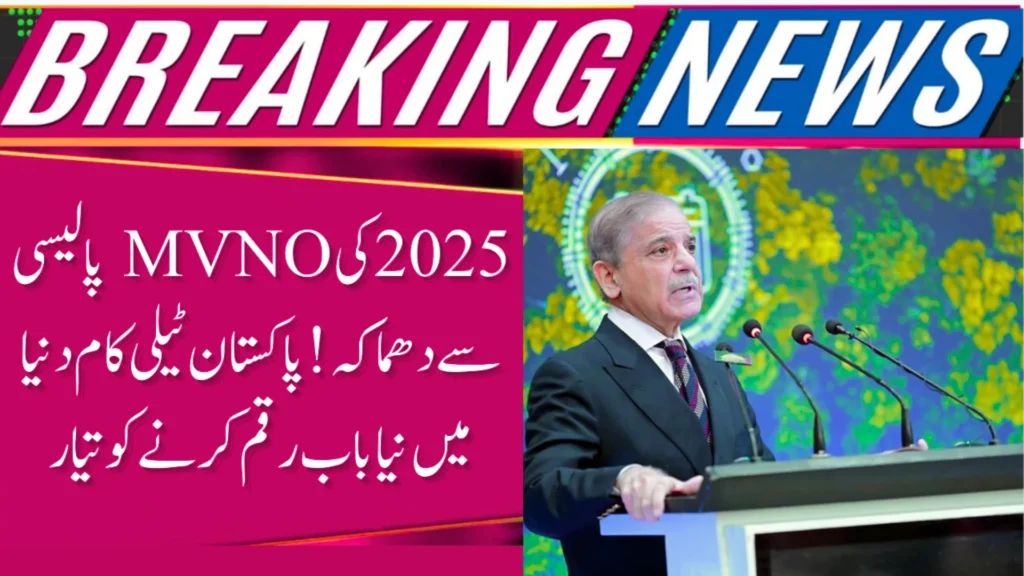
The government of Pakistan has taken a decisive leap toward a connected and competitive digital economy with the PM Shehbaz MVNO Policy 2025. This forward-looking initiative, driven by Prime Minister Shehbaz Sharif, focuses on enabling Mobile Virtual Network Operators (MVNOs) to operate under a formal, transparent framework. It’s a move that could transform Pakistan’s telecom industry, foster innovation, and open new opportunities for both local and international players.
What Is the PM Shehbaz MVNO Policy 2025?
At its core, the MVNO Policy 2025 is a strategic plan designed to diversify Pakistan’s telecom landscape. Instead of relying solely on major telecom operators, the new framework allows smaller or specialized companies known as Mobile Virtual Network Operators, to offer mobile services by leasing capacity from existing network operators (MNOs).
In simple terms, an MVNO doesn’t own cell towers or radio spectrum; it partners with major telecom companies to provide its own branded services. This approach encourages competition, brings down prices, and offers customers more personalized options, whether for mobile data, voice plans, or digital bundles.
Why This Policy Matters
For years, Pakistan’s telecom sector has been dominated by a handful of large players. While these companies have invested heavily in infrastructure, market concentration has limited innovation. The MVNO Policy 2025, guided by the Ministry of Information Technology and Telecommunication (MoITT) and implemented by the Pakistan Telecommunication Authority (PTA), aims to change that.
Under this policy:
- MVNOs will be granted 15-year licenses to operate.
- The initial nationwide license fee is set at $140,000, payable in local currency as per the National Bank of Pakistan’s exchange rate.
- Licensees will contribute annually to the Universal Service Fund (USF) and R&D Fund, ensuring sustainability and technological advancement.
According to official sources, the framework has already undergone stakeholder consultations and is awaiting federal cabinet approval, a final step before commercial rollout.
Key Features of the MVNO Policy
1. Encouraging Fair Competition
The new policy encourages open market dynamics by allowing smaller businesses to compete with established telecom giants. This competition is expected to drive:
- Better service quality
- Affordable packages
- Tailored digital solutions for niche markets, such as fintech or IoT-based services
2. Regulatory and Financial Transparency
The PTA will oversee licensing, compliance, and quality benchmarks. Both MVNOs and MNOs are required to maintain transparent financial reporting and regulatory payments, ensuring a level playing field.
3. Customer-Centric Standards
MVNOs must:
- Maintain at least one customer service center in every operational city
- Operate a 24/7 nationwide helpline
- Adhere to PTA’s quality-of-service standards
This ensures consumers receive consistent service quality regardless of which virtual operator they choose.
4. National Security Compliance
To maintain data integrity and lawful access, MVNOs are bound by the same national security and data interception laws as MNOs. They must also integrate with the Device Identification Registration and Blocking System (DIRBS) for SIM verification and fraud prevention.
5. Service Continuity and Accountability
Parent MNOs are obligated to provide uninterrupted services to their MVNO partners and cannot terminate agreements without prior PTA approval. Conversely, MVNOs must give at least three months’ notice before discontinuing operations, protecting consumer interests.
How It Will Impact Pakistan’s Telecom Industry
The PM Shehbaz MVNO Policy 2025 could be a game-changer for Pakistan’s telecom ecosystem. By lowering entry barriers, it invites global investors and local startups to enter the market without the heavy cost of infrastructure. This, in turn, will:
- Create jobs in tech and customer service
- Expand digital inclusion in remote regions
- Encourage localized digital services such as mobile banking and e-learning
- Stimulate foreign direct investment (FDI) in the telecom and IT sectors
It also aligns perfectly with the Digital Pakistan Vision, which aims to connect every citizen through affordable, reliable, and secure digital access.
The Bigger Picture: A Step Toward Digital Empowerment
Digital transformation isn’t just about faster internet, it’s about accessibility, innovation, and empowerment. With MVNOs entering the market, users could see:
- More diverse mobile packages
- Hybrid models combining telecom and tech services
- Enhanced customer support through digital-first experiences
For example, fintech startups could offer mobile-based financial services, or education platforms might bundle internet data with learning tools. These integrations could make digital participation more affordable and inclusive.
Conclusion
The PM Shehbaz MVNO Policy 2025 is more than a telecom regulation, it’s a strategic enabler of Pakistan’s digital future. If implemented effectively, this policy could redefine competition, empower consumers, and bring Pakistan closer to becoming a digitally empowered economy. With the right oversight and collaboration between government and industry, this initiative can set a new benchmark for innovation in South Asia’s telecom landscape.
Frequently Asked Questions (FAQs)
1. What does MVNO stand for?
MVNO stands for Mobile Virtual Network Operator, a company that provides mobile services without owning network infrastructure.
2. Who announced the MVNO Policy 2025?
Prime Minister Shehbaz Sharif announced the initiative as part of his digital transformation agenda.
3. What is the main goal of the policy?
To promote competition, attract investment, and expand digital access across Pakistan.
4. How long is the MVNO license valid for?
Each license will be valid for 15 years, subject to renewal and compliance with PTA regulations.
5. How much is the license fee?
The initial nationwide MVNO license fee is $140,000, payable in local currency.
6. Which authority will regulate MVNOs?
The Pakistan Telecommunication Authority (PTA) will regulate, license, and monitor MVNO operations.
7. What are MVNOs required to contribute annually?
They must contribute to the Universal Service Fund (USF) and R&D Fund based on their annual revenue.
8. Will this policy attract foreign companies?
Yes. It opens the market for global telecom investors and digital startups seeking entry into Pakistan.
9. How will it benefit consumers?
Consumers can expect better pricing, improved service quality, and more customized digital solutions.
10. When will the policy take effect?
The framework is awaiting final approval from the federal cabinet and is expected to roll out soon.





